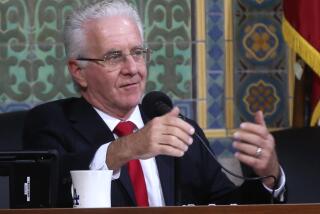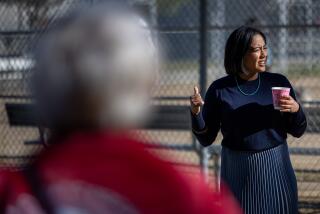First & Spring: Special interests are at center of L.A. election date debate
As it waits for a City Council vote on new rules for electronic billboards, outdoor advertising company Clear Channel Outdoor has become a major backer of the campaign to change L.A.’s election dates.
The company recently gave $25,000 to the campaign for Charter Amendments 1 and 2, the March 3 ballot measures that would align L.A. city and school board races with higher-turnout state and presidential elections.
Supporters say the change in election dates, which are backed by council President Herb Wesson and would go into effect in 2020, will diminish the power of special interests by getting more voters to the polls. But records show that, so far, many of those lining up behind the measures — public employee unions, business groups and a handful of private companies — have past or present stakes in City Hall decisions.
Denver-based CP Development, which won city approval last year for a downtown high-rise, gave $25,000 to a committee promoting the measures. So did the L.A. County Federation of Labor, which fought a move to scale back city employee pension costs and, more recently, convinced the council to hike the minimum wage at large hotels.
Foes of the ballot proposals say the contributions and endorsements show that special interests think the measures will benefit them by increasing their success rate in electing candidates.
Once L.A. elections are combined with state and federal elections, airwaves and mailboxes will be so crowded with campaign advertising that local, grassroots candidates will struggle to raise the money needed to connect with voters, said political consultant Hans Johnson, who lives in Eagle Rock and signed the argument against the ballot measures.
“This would give these special interests an even stronger grip over picking winners and losers,” he said.
Kathay Feng, co-chair of the campaign seeking the election changes, dismissed that notion, saying special interests enjoy greater influence in elections where they have fewer voters paying attention. She said the committee backing the two ballot measures, known formally as Citizens for Increased Voter Participation, is trying to make “honorable choices” about which contributions it accepts.
On Feb. 5, the committee returned a $25,000 contribution from Anschutz Entertainment Group. That money was provided a week before the council cast a vote favorable to AEG on a lucrative contract to run the Greek Theatre. “The timing [of the vote] was so close that it was important that it not taint the … campaign,” she said.
Feng said she did not know who, if anyone, asked for the donation. AEG spokesman Michael Roth would say only that the campaign committee asked for the money.
The debate, and Feng’s role in it, is unusual for L.A. politics. Feng, who heads the government watchdog group California Common Cause, frequently raises alarms about campaign spending and special interests. This time around, she’s fielding questions about her committee’s political fundraising — and whether those donors are seeking to curry favor with L.A.’s elected officials, including Wesson.
Asked about the $25,000 donated by billboard firm Clear Channel, she said she would meet with other campaign officials to discuss whether to keep the money. “Now that you’ve raised that issue with me, I’m going to call another meeting,” she said.
Fiona Hutton, Clear Channel’s spokeswoman, did not respond to a question about who asked her company to contribute. “Clear Channel Outdoor is participating in the political process and supporting two measures that will help increase voter participation,” she said in an email.
Feng and her allies say the bigger issue is getting more people involved in the democratic process. Voter turnout in L.A. elections has been steadily declining, reaching 23% in the May 2013 mayoral campaign. Changing the election date, backers of the ballot measure say, would bring in a broader, more representative group of voters, including more low-income voters, African Americans and Latinos. Other cities that hold their elections in even-numbered years have seen higher voter participation.
Feng contends that some foes of the charter amendments, including Johnson, are fighting the measures because they believe moving L.A.’s elections from odd to even numbered years could cut into their political consulting business. “That’s something they’re fighting tooth and nail,” she said.
Johnson, president of the consulting firm Progressive Victory, said in 15 years he’s only been paid once to work for a candidate in a local L.A. election. In that instance, he said, the firm received $500 in 2012 to provide advice to school board candidate Abelardo Diaz.
Opponents of the ballot measure haven’t yet set up a campaign committee or, according to Johnson, solicited political contributions.
By contrast, Citizens for Increased Voter Participation has collected more than $150,000, at least half of which came from groups that do business at City Hall, according to contribution records posted last week. Major donors also include a Vernon-based apparel manufacturer and a West Hollywood-based property management firm.
The campaign also has lined up endorsements from city employee unions, including the Police Protective League, which has been at odds with Mayor Eric Garcetti over its salary negotiations for months. Two years ago, the league spent more than $1.4 million to elect then-City Controller Wendy Greuel as mayor. Garcetti won and has repeatedly resisted the league’s call for a pay raise this fiscal year.
Boyle Heights activist Hector Huezo, who also opposes the charter amendments, said the issues surrounding the proponents’ campaign go beyond contributors and endorsers. One of the campaign’s three co-chairs, political science professor Fernando Guerra, is a registered City Hall lobbyist, Huezo said.
Wesson, the council president, named Guerra to a citizens’ commission that recommended the election cycle change. Guerra’s lobbying clients last year were information technology company Unisys and downtown-based ICO Development, according to Ethics Commission records.
Those connections symbolize larger problems with the two ballot measures, Huezo said. “This is definitely a way for big companies, and big interests, to get a representative of their own on the council,” he said.
Guerra did not respond to requests for comment. But Dave Jacobson, spokesman for the ballot measure campaign, said Guerra belongs to “a trio of L.A.’s foremost experts in electoral politics” who are heading up the committee. The other two are Feng and Dan Schnur, former chairman of the California Fair Political Practices Commission.
“These three independent reformers are precisely the kind of leadership team voters trust to bring more transparency, integrity and participation to L.A.’s elections,” Jacobson said in a statement.
Follow @DavidZahniser for what’s happening at Los Angeles City Hall.
More to Read
Sign up for Essential California
The most important California stories and recommendations in your inbox every morning.
You may occasionally receive promotional content from the Los Angeles Times.











